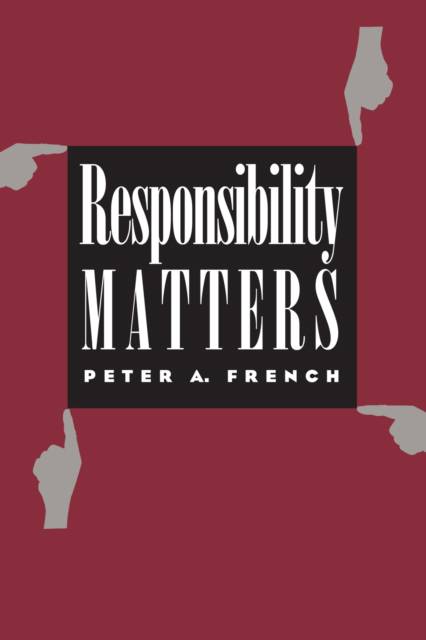
- Retrait gratuit dans votre magasin Club
- 7.000.000 titres dans notre catalogue
- Payer en toute sécurité
- Toujours un magasin près de chez vous
- Retrait gratuit dans votre magasin Club
- 7.000.0000 titres dans notre catalogue
- Payer en toute sécurité
- Toujours un magasin près de chez vous
Description
Most of us spend a fair amount of time trying to avoid responsibility. That's not too astounding. What is surprising, says Peter French, is that we tend to dodge the good variety as well as the bad. "The problem for most of us, excepting moral masochists, is that responsibility does get doled," he writes. "The strategy is either not to be in the receiving line or to find a way to get as little dumped on one's plate as possible, to trade off to others as much as one can. Consequently, the responsibility barter game is probably the most common experience ordinary people have with morality." In Responsibility Matters, French investigates a variety of matters relating to responsibility-from theoretical aspects and elements of the concept of responsibility to specific areas of application and general issues in moral theory. Unlike Kant and others who see responsibility as a necessary presupposition of practical life, he believes it is a set of practices that we use to describe and understand individual and social behavior. Using examples from literature, film, and current events as well as traditional philosophical literature, he raises questions about responsibility in political, environmental, legal, medical, corporate, and military justice matters. He also covers other issues, including fate, innocence, power, control, and individual and group responsibility.
Spécifications
Parties prenantes
- Auteur(s) :
- Editeur:
Contenu
- Nombre de pages :
- 248
- Langue:
- Anglais
Caractéristiques
- EAN:
- 9780700606269
- Date de parution :
- 23-11-92
- Format:
- Livre broché
- Format numérique:
- Trade paperback (VS)
- Dimensions :
- 155 mm x 229 mm
- Poids :
- 344 g

Les avis
Nous publions uniquement les avis qui respectent les conditions requises. Consultez nos conditions pour les avis.






